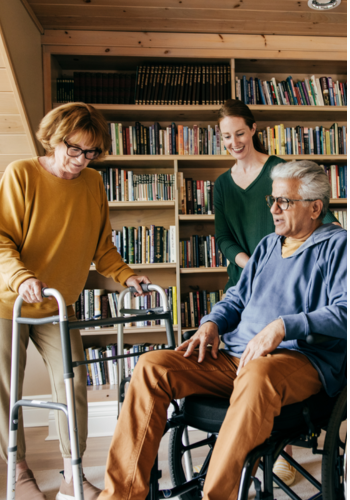Making Decisions About Care
Caregivers are superheroes, especially the primary caregiver responsible for the person’s day-to-day care. However, there might come a time when you need to consider accepting help. Help can come in many forms – asking family members or friends, accepting help from your faith community, or contacting your local council on aging or Alzheimer’s organization.
There is no shame in asking for help or at least seeking answers to important questions while you try to plan for the future.

How will I know when I need more help?
Caregiving can be physically, emotionally and financially stressful. It’s important to get help early and often, but many caregivers wait and try to do it on their own until the stress is too much. When you feel stressed to the point you cannot manage your own health, or not participating in usual activities, or can no longer meet the person’s care needs – you may need more help. Many life circumstances can add to the list of reasons why more help is necessary. Although this is not an exhaustive list, examples include:
- Caregivers who are employed in addition to caring.
- Caregivers who are taking care of young children and older relatives may be spread too thin.
- Caregivers who themselves are older and must attend to their own health needs.
- Caregivers who live far from where day-to-day support is needed.
Caregivers often feel guilt when they reach the point where they can no longer support the person on their own. It’s important to remember that you have done your very best to provide care and you are doing what’s in the best interest of the person needing care and yourself. It may help to shift your mindset about needing help.
One way to think about it is you are freeing up time to reconnect with the person in other ways. For example, providing personal care such as toileting or bathing may have changed the nature of your relationship. If those tasks are done by someone else, then you can return to being the person’s husband, wife, partner, daughter, son or other relationship.
You are now an advocate for the person. Your new role is to ensure those providing care and the services you are using are meeting the person’s needs. Other benefits of delegating care to another person include some well needed sleep and the ability to recharge so that you can enjoy spending time with the person receiving care. Think about how you would like to spend your time differently.

What kind of help does the person I am caring for need?

People in the early stages may need help with transportation, social support and initiating some tasks. Think about the activities the person enjoyed before they experienced mild symptoms. What modifications may be needed in order for the person to continue enjoying those activities? Do they need a ride or a companion to accompany them?
People with moderate or late stage dementia require constant supervision and support. In addition to the person’s social needs, their physical needs sometimes require lifting and transferring to help the person get out of bed, get dressed, use the toilet, and bathe. Sometimes caregivers only need help at a specific time of day – such as mornings and evenings – or a couple days per week to help with bathing, cooking, or grocery shopping. Sometimes caregivers need a break while the person with dementia goes off to do an activity with other people. Both people benefit – the caregiver gets a much needed break – and the person with dementia gets to enjoy a social outing.
It may help to make a weekly schedule of all of your tasks and social activities. What tasks can you delegate? What activities do you want to continue doing? Can you identify any specific days of the week or tasks where someone else can help?
The most important thing your loved one needs is for you to be your best self.
In addition to thinking about what the person needs, think about what you need. Do you need more sleep because the person stays up late or wakes up in the night? Do you need someone to look after your loved one while you grocery shop, attend a faith-based activity, or go to a doctor’s appointment? Before reaching out for help, make a list of your needs and their needs, and plan a rough idea of what you’d like to see. Remember, asking for help one day per week or one hour is a good start to build your confidence and to take better care of yourself. Give it a try!
What kind of help is available?

Depending on the person’s needs, there are many ways to access help. Informal assistance can come from family members, friends, or neighbors. Formal assistance can be accessed from starting with your local council on aging or Alzheimer’s organization. These organizations can provide information, referrals, and sometimes financial resources.
Informal Help
Before seeking formal help, think about who else may be willing to assist in small and large ways. Think about the people who have offered help in the past, but maybe you didn’t take the offer seriously at the time. Are there other family members, friends, or neighbors who might help out? If being direct in asking for help makes you uncomfortable, ask if they know anyone or can share a referral. Perhaps they will know someone or will offer to help you themselves. Don’t be too shy to accept help when its offered.
Formal Help
When seeking formal help, do your research. Contact your local council on aging or Alzheimer’s organization to ask about what help is available in your community. Attend a support group online or in your local community to hear from other caregivers what kind of help they are using. Formal help can be anything from help in the home to placing the person into long term residential care. The Eldercare Locator can help you find services available to help a person with dementia live at home as long as possible. When living at home is no longer possible, long term residential care may be needed.
Learn more about healthcare, community-based services and long term residential care in our Aging and Dementia Services section here.
Helpful Links
If you have additional questions, the Helpful Links section includes links and additional resources of the most commonly asked questions by caregivers and a list of organizations and government resources to visit. To get to other sections in Emotional or Physical Support, scroll down.
Encouraging Words:
Regardless of what challenge you are facing right now, know that it has not come to stay. It has come to pass. During these times, do what you can with what you have, and ask for help if needed.
Most importantly, never surrender. Put things in perspective. Take care of yourself. Find ways to replenish your energy, strengthen your faith and fortify yourself from the inside out.
– Les Brown
The information on this page was developed by Nicole Batsch, Ph.D. and is for educational purposes.
For individualized medical guidance, consult your physician.
